- Home
- J. Robert Kennedy
The Nazi's Engineer
The Nazi's Engineer Read online
The Nazi's Engineer
A James Acton Thriller
by
J. Robert Kennedy
From the Back Cover
ONE OF THE SECOND WORLD WAR’S MOST ENDURING MYSTERIES IS ABOUT TO BE SOLVED.
BUT AT WHAT COST?
Nazi Germany. 1945. When Detective Inspector Wolfgang Vogel is approached by his distraught neighbor, begging him to find her missing husband, he is quickly drawn into a case the Gestapo and SS are determined he never solve, putting his own life, and that of his family, at risk.
And over 70 years later, Archaeology Professor James Acton and his wife discover the horrifying reason behind what turns out to be far more than a simple missing persons case, the revelation thrusting them into the middle of something much bigger than they could have ever imagined.
A discovery worth unfathomable millions.
And like the Nazis, there are those today who will stop at nothing to possess what they have found.
From USA Today bestselling author J. Robert Kennedy comes The Nazi’s Engineer, the latest instalment in the action-packed globe-spanning James Acton Thrillers series, certain to leave you breathless. If you enjoy fast-paced adventures in the style of Dan Brown, Clive Cussler, and James Rollins, then you’ll love this taut tale of archaeological intrigue.
Get The Nazi’s Engineer now, and discover the solution to one of archaeology’s most enduring mysteries!
About the James Acton Thrillers
"James Acton: A little bit of Jack Bauer and Indiana Jones!"
Though this book is part of the James Acton Thrillers series, it is written as a standalone novel and can be enjoyed without having read any of the previous installments.
About J. Robert Kennedy
With over 850,000 books sold and over 7000 five-star reviews, USA Today bestselling author J. Robert Kennedy has been ranked by Amazon as the #1 Bestselling Action Adventure novelist based upon combined sales. He is the author of over thirty-five international bestsellers including the smash hit James Acton Thrillers. He lives with his wife and daughter, and writes full-time.
"A master storyteller." — Betty Richard
"A writer who tells what we are thinking but sometimes afraid to say." — Bruce Ford
"Kennedy kicks ass in this genre." — David Mavity
"One of the best writers today." — Johnny Olsen
"If you want fast and furious, if you can cope with a high body count, most of all if you like to be hugely entertained, then you can’t do much better than J Robert Kennedy." — Amazon Vine Voice Reviewer
Get 5 Free eBooks!
Get the J. Robert Kennedy Starter Library by joining The Insider’s Club and be notified when new books are released!
Find out more at www.jrobertkennedy.com.
Follow me on Facebook, BookBub, GoodReads and Twitter.
Books by J. Robert Kennedy
The James Acton Thrillers
The Protocol
Brass Monkey
Broken Dove
The Templar’s Relic
Flags of Sin
The Arab Fall
The Circle of Eight
The Venice Code
Pompeii’s Ghosts
Amazon Burning
The Riddle
Blood Relics
Sins of the Titanic
Saint Peter’s Soldiers
The Thirteenth Legion
Raging Sun
Wages of Sin
Wrath of the Gods
The Templar’s Revenge
The Nazi’s Engineer
The Special Agent Dylan Kane Thrillers
Rogue Operator
Containment Failure
Cold Warriors
Death to America
Black Widow
The Agenda
Retribution
The Delta Force Unleashed Thrillers
Payback
Infidels
The Lazarus Moment
Kill Chain
Forgotten
The Detective Shakespeare Mysteries
Depraved Difference
Tick Tock
The Redeemer
The Templar Detective Thrillers
The Templar Detective
Zander Varga, Vampire Detective Series
The Turned
Table of Contents
Get 5 Free eBooks!
Table of Contents
Beginning
Preface
1
2
3
4
5
6
7
8
9
10
11
12
13
14
15
16
17
18
19
20
21
22
23
24
25
26
27
28
29
30
31
32
33
34
35
36
37
38
39
40
41
42
43
44
45
46
47
48
49
50
51
52
53
54
55
56
57
58
59
60
61
62
63
64
65
66
67
68
69
70
71
72
73
74
75
76
Acknowledgements
Don't Miss Out!
Thank You!
About the Author
Also by the Author
For the Monuments Men, who risked their lives in an attempt to save the over 5 million pieces of art looted by the Nazis.
“I vow to you, Adolf Hitler, as Führer and chancellor of the German Reich, loyalty and bravery. I vow to you and to the leaders that you set for me, absolute allegiance until death. So help me God.”
SS Oath of Loyalty
“Art belongs to humanity. Without this we are animals. We just fight, we live, we die. Art is what makes us human.”
Mikhail Piotrovsky, Director, Hermitage Museum
Preface
In January 1945, Adolf Hitler issued orders to begin evacuation of artwork kept in Königsberg, Prussia, in anticipation of the eventual arrival of the Red Army. During the reign of the Nazis, millions of pieces of art were stolen from across Europe. Many were destroyed intentionally when the defeat of Nazi Germany was imminent, others fell victim to Allied bombing, and still others disappeared without a trace, never to be seen again.
Including the subject of this book, an artistic wonder so valuable, it is heartbreaking to contemplate what might have happened to it. Some say it was destroyed, though the sheer scale of this masterpiece suggests that were it destroyed where it was last known to have been kept, surely some evidence of it would have remained.
Leaving only one possibility.
It was moved before it was too late.
1
South of Marienwerder, West Prussia
Nazi Germany
January 28, 1945
Something had changed. Hermann Lang was sure of it. As he slowed his locomotive to a crawl, he peered into the darkness, his dimmed lights barely giving him
a track’s length of visibility, having one’s train well-lit never wise in case Allied aircraft made it a target of opportunity.
Yet something had definitely changed. He knew these tracks like the back of his hand. He had been here scores of times, usually to pick up ore from the mine somewhere in the darkness ahead, sometimes to deliver supplies or workers. When the war was going well, which it hadn’t been for some time, these runs were made in broad daylight, or at night with lights ablaze.
But no longer.
His hometown of Berlin was under near-constant bombardment by the Allies, and whispered reports were that the Russians could be on their doorstep within months.
The Thousand-Year Reich would soon be defeated.
He wasn’t sure how he felt about that. He had grown up during the Great Depression, far worse in Germany than anywhere else in the world thanks to the punitive Treaty of Versailles. The war reparations Germany had been forced to pay as punishment for its actions, were crippling.
And Adolf Hitler had offered a way out to the impoverished, desperate citizens of a defeated Germany.
To fight back.
To take back what had been stolen, and rebuild.
He had embraced the idea, almost from the beginning. He had even joined the Party, thinking it was his patriotic duty, though mostly because it meant you went to the head of the line for jobs. He was fortunate he hadn’t been required to fight. As a trained engineer, a skill in desperate need, he had been spared that horror, though most of his friends hadn’t.
It racked him with guilt every time he saw the dead and wounded, or heard another widow or mother cry out in agony when the telegram arrived.
He just prayed his wife never received such a message.
Though with what he had been told yesterday, he was terrified he would be the one receiving a telegram.
What had his wife been thinking? Speaking out against the Reich? The very idea seemed nonsensical to him, completely unbelievable, though not because she was fiercely loyal to the Führer. It was because she wasn’t an idiot. She knew what could happen.
And that was why he had refused to believe the accusations.
Until the names of three other women were provided, all friends of hers, all women that regularly gathered to gossip.
And it was apparently one of these sessions that was reported to the Gestapo, probably by one of the women whose husband needed to prove his loyalty for a promotion.
They had threatened to take her in for interrogation if he didn’t cooperate, and he knew what that meant. He would never see her again. Too many disappeared these days, convincing him it had little to do with people fleeing the city, and everything to do with the Gestapo rounding up anyone they suspected of not being 100% loyal to the cause.
The lights caught a glint of metal, and he recognized the gates of the mine outside Marienwerder. In the shadows, he saw the silhouettes of several guards and a couple of canine units, but the entire area was under a complete blackout.
This was the strangest run on which he had ever been. They had called him in at the last minute, just before he was about to head home to Berlin to see his wife for the first time in months, and sent on what was a regular run except for the cargo.
What that cargo was, he had no idea, and the pickup location was unusual. Königsberg. He had never picked up anything destined for the mine from there before, though perhaps others had. Those who served this region worked most of the routes, rotating through them to relieve the boredom.
But this load he was transporting was like no other before. There were only two boxcars, already hooked up and sealed when he had arrived, and the train had been surrounded by SS soldiers. He had been ordered to leave his fireman at the last junction, left to travel the final leg by himself.
That was unheard of.
If he were going anywhere else, he’d think his cargo was some top-secret military equipment. But he wasn’t going anywhere else, he was going to a regular old mine, one he had heard was due to be shut down as it was now almost barren.
The locomotive jerked to the left unexpectedly, and he leaned out the window, peering into the dark, his dim lights glimmering off brand new track.
Something had changed, but this wasn’t it.
Then it dawned on him.
There were no sounds. Normally when he was here, over the engine he could hear equipment operating, men shouting—the sounds of everyday life at a mine. Even with minimal lighting at night, the mine still operated, its materials essential to the war effort.
But tonight, there was nothing beyond the sound of his engine.
And a dog barking in the darkness.
A flashlight shone in his face and he raised a hand to block the glare. Somebody hopped on the running board, the beam lowered.
“Just keep going, I’ll tell you where to stop.”
Hermann nodded, then sweat broke out over his entire body as he caught a glimpse of the SS emblem on the man’s collar, a skull and crossbones on his hat. He kept them moving forward, slow and steady, his heart pounding hard as he tried to appear calm.
And why was that? He had done nothing wrong. He was doing his job and doing it well, as ordered. If he had arrived unexpectedly, or in some incorrect fashion, would this man have climbed on board and told him to keep going as he was? No, there would have been cursing and beratement as was typical of an SS officer.
Yet he was still terrified of this man.
And it was the second time in one night he had encountered the SS.
First at the beginning of his run, and now at the end of it.
He was certain that whatever cargo he carried was of the utmost importance to the SS, and if it was important to them, it was important to the Reich. The SS were the Schutzstaffel, or Protection Squadron, under the direct command of Reichsführer Heinrich Himmler himself, and fiercely loyal to the Führer, the Nazi Party, and the ideals of the Reich.
And with a notoriously low opinion of anyone who didn’t have their insignia on their collar.
He spotted the entrance to the mine, but it wasn’t the usual one. The tracks were still new, and he had never been this way. In fact, he had never known this entrance existed. Either a new shaft in the mine had been opened, or an old one had been reopened. Whatever the answer was, he was about to find out, as his dim lights that failed to pick up the emptiness that surrounded the tracks outside, suddenly lit the tight confines of the tunnel they were now in with little problem.
And it was all old construction.
Very old.
In fact, if he had to guess, this area of the mine had been shut down for years if not decades. As they slowly rounded a bend, he spotted a bright glow ahead, and moments later the train emerged into a large hollowed out area filled with several other boxcars, all with crates being offloaded. Dozens of men he recognized from the mine were moving the crates, and they appeared exhausted. He counted at least a dozen SS coordinating the effort, all fresh in their crisp uniforms, not a hair out of place as they did none of the manual labor.
“Stop here.”
“Yes, sir.”
He brought his train to a halt, the screeching of the brakes piercing in the confined space, only the SS wincing with pain, the workers used to the noise. He was quickly uncoupled and directed ahead, then switched onto a siding track and ordered to reverse out. He kept his eyes on the job, trying not to look at the goings on, and as they were about to leave the lighted chamber, the SS colonel swatted him on the shoulder.
“Back it out then wait for me, understood?”
“Yes, sir.”
The colonel hopped to the ground and began barking orders for the two cars he had just delivered to be opened, but not unloaded. Hermann wondered what made his cargo so special to be left aboard, though decided asking such questions, even of himself, was unwise. As he reversed out of the mine and returned to the crisp January air, he again could see little in the overcast sky beyond the shiny new tracks and the snow covering the ground. He
brought the locomotive to a halt and put it in idle, waiting for the return of the colonel.
I wonder what he wants.
It could be as simple as a lift back to the city. It wouldn’t be the first time, though he couldn’t recall transporting an SS officer unscheduled, and definitely never where he would have had to share his cab, as there were no passenger cars on this train.
As he waited, he could pick out the shadows moving around him. The mine might be closed, but the security detail seemed larger than normal.
“Turn out your lights!” shouted someone from the darkness.
“Yes, sir!” He immediately complied, cursing for being so foolish. When underway, there was a need for at least some minimal lighting ahead, though to be honest, at high speed, if the tracks were out ten feet beyond, you were screwed no matter what. At least, though, you’d have a few seconds to say a prayer before your fate was sealed.
But at idle, the lights should never be on in blackout conditions.
A flashlight bobbed ahead, and his now adjusted eyes spotted what appeared to be the SS colonel, followed by several armed soldiers.
“Get down!”
Hermann’s eyes narrowed, wondering what possible reason this man could have for wanting him out of the locomotive. “Sir?”
“Now!”
The soldiers all aimed their weapons at him as the echoes of gunshots and the screams of men erupted from the tunnel.
Oh my God!
It was then that he realized what was happening. The miners were being executed, as they had seen what had happened here on this dark, cold night.
They were witnesses.
And so was he.
He hit the reversing lever, throwing the train into full reverse as he ducked. Gunfire pelted the locomotive as the three soldiers opened up on him. The glass shattered, showering him with shards, and he kept his head down as the train slowly gained speed.

_preview.jpg) The Protocol (A James Acton Thriller, Book #1)
The Protocol (A James Acton Thriller, Book #1)_preview.jpg) Depraved Difference (A Detective Shakespeare Mystery, Book #1)
Depraved Difference (A Detective Shakespeare Mystery, Book #1) Atlantis Lost
Atlantis Lost The Tomb of Genghis Khan
The Tomb of Genghis Khan_preview.jpg) Rogue Operator (A Special Agent Dylan Kane Thriller, Book #1)
Rogue Operator (A Special Agent Dylan Kane Thriller, Book #1) Forgotten
Forgotten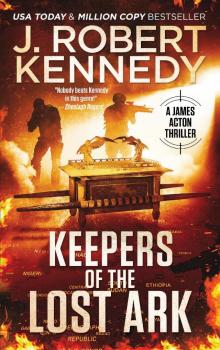 Keepers of the Lost Ark
Keepers of the Lost Ark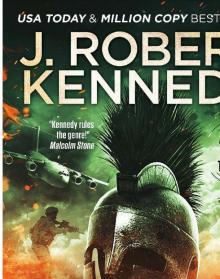 The Cylon Curse
The Cylon Curse The Colonel's Wife
The Colonel's Wife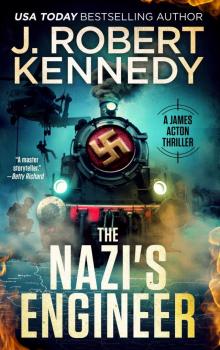 The Nazi's Engineer
The Nazi's Engineer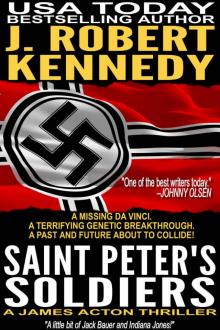 Saint Peter's Soldiers (A James Acton Thriller, Book #14)
Saint Peter's Soldiers (A James Acton Thriller, Book #14)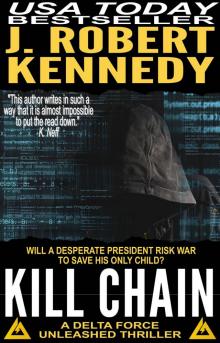 Kill Chain
Kill Chain Rogue Operator
Rogue Operator Containment Failure (A Special Agent Dylan Kane Thriller, Book #2)
Containment Failure (A Special Agent Dylan Kane Thriller, Book #2) The Lazarus Moment
The Lazarus Moment The Arab Fall (A James Acton Thriller, Book #6) (James Acton Thrillers)
The Arab Fall (A James Acton Thriller, Book #6) (James Acton Thrillers) Payback
Payback Flags of Sin - 05
Flags of Sin - 05 The Viking Deception
The Viking Deception The Templar's Revenge (A James Acton Thriller, #19) (James Acton Thrillers)
The Templar's Revenge (A James Acton Thriller, #19) (James Acton Thrillers) Retribution - A Special Agent Dylan Kane Thriller Book #7
Retribution - A Special Agent Dylan Kane Thriller Book #7 Tick Tock (A Detective Shakespeare Mystery, Book #2)
Tick Tock (A Detective Shakespeare Mystery, Book #2) Blood Relics (A James Acton Thriller, #12)
Blood Relics (A James Acton Thriller, #12) The Templar Detective
The Templar Detective Cold Warriors (A Special Agent Dylan Kane Thriller, Book #3)
Cold Warriors (A Special Agent Dylan Kane Thriller, Book #3)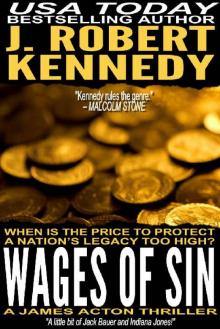 Wages of Sin (A James Acton Thriller, #17) (James Acton Thrillers)
Wages of Sin (A James Acton Thriller, #17) (James Acton Thrillers) The Templar Detective and the Parisian Adulteress
The Templar Detective and the Parisian Adulteress Pompeii's Ghosts (A James Acton Thriller, #9)
Pompeii's Ghosts (A James Acton Thriller, #9) Raging Sun (A James Acton Thriller, #16) (James Acton Thrillers)
Raging Sun (A James Acton Thriller, #16) (James Acton Thrillers) The Riddle (A James Acton Thriller, Book #11)
The Riddle (A James Acton Thriller, Book #11)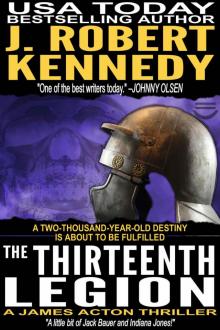 The Thirteenth Legion (A James Acton Thriller, #15) (James Acton Thrillers)
The Thirteenth Legion (A James Acton Thriller, #15) (James Acton Thrillers) Wrath of the Gods (A James Acton Thriller, #18) (James Acton Thrillers)
Wrath of the Gods (A James Acton Thriller, #18) (James Acton Thrillers) Sins of the Titanic (A James Acton Thriller, #13)
Sins of the Titanic (A James Acton Thriller, #13) Amazon Burning (A James Acton Thriller, #10)
Amazon Burning (A James Acton Thriller, #10)